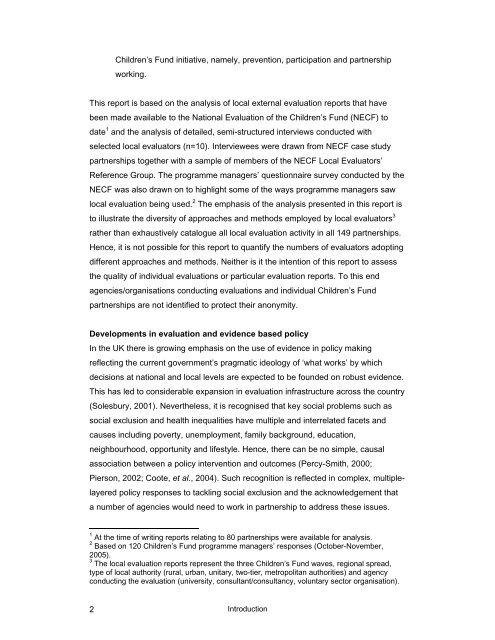Local Evaluation of Children's Services Learning from the Children's ...
Local Evaluation of Children's Services Learning from the Children's ...
Local Evaluation of Children's Services Learning from the Children's ...
- No tags were found...
You also want an ePaper? Increase the reach of your titles
YUMPU automatically turns print PDFs into web optimized ePapers that Google loves.
Children’s Fund initiative, namely, prevention, participation and partnershipworking.This report is based on <strong>the</strong> analysis <strong>of</strong> local external evaluation reports that havebeen made available to <strong>the</strong> National <strong>Evaluation</strong> <strong>of</strong> <strong>the</strong> Children’s Fund (NECF) todate 1 and <strong>the</strong> analysis <strong>of</strong> detailed, semi-structured interviews conducted withselected local evaluators (n=10). Interviewees were drawn <strong>from</strong> NECF case studypartnerships toge<strong>the</strong>r with a sample <strong>of</strong> members <strong>of</strong> <strong>the</strong> NECF <strong>Local</strong> Evaluators’Reference Group. The programme managers’ questionnaire survey conducted by <strong>the</strong>NECF was also drawn on to highlight some <strong>of</strong> <strong>the</strong> ways programme managers sawlocal evaluation being used. 2 The emphasis <strong>of</strong> <strong>the</strong> analysis presented in this report isto illustrate <strong>the</strong> diversity <strong>of</strong> approaches and methods employed by local evaluators 3ra<strong>the</strong>r than exhaustively catalogue all local evaluation activity in all 149 partnerships.Hence, it is not possible for this report to quantify <strong>the</strong> numbers <strong>of</strong> evaluators adoptingdifferent approaches and methods. Nei<strong>the</strong>r is it <strong>the</strong> intention <strong>of</strong> this report to assess<strong>the</strong> quality <strong>of</strong> individual evaluations or particular evaluation reports. To this endagencies/organisations conducting evaluations and individual Children’s Fundpartnerships are not identified to protect <strong>the</strong>ir anonymity.Developments in evaluation and evidence based policyIn <strong>the</strong> UK <strong>the</strong>re is growing emphasis on <strong>the</strong> use <strong>of</strong> evidence in policy makingreflecting <strong>the</strong> current government’s pragmatic ideology <strong>of</strong> ‘what works’ by whichdecisions at national and local levels are expected to be founded on robust evidence.This has led to considerable expansion in evaluation infrastructure across <strong>the</strong> country(Solesbury, 2001). Never<strong>the</strong>less, it is recognised that key social problems such associal exclusion and health inequalities have multiple and interrelated facets andcauses including poverty, unemployment, family background, education,neighbourhood, opportunity and lifestyle. Hence, <strong>the</strong>re can be no simple, causalassociation between a policy intervention and outcomes (Percy-Smith, 2000;Pierson, 2002; Coote, et al., 2004). Such recognition is reflected in complex, multiplelayeredpolicy responses to tackling social exclusion and <strong>the</strong> acknowledgement thata number <strong>of</strong> agencies would need to work in partnership to address <strong>the</strong>se issues.1 At <strong>the</strong> time <strong>of</strong> writing reports relating to 80 partnerships were available for analysis.2 Based on 120 Children’s Fund programme managers’ responses (October-November,2005).3 The local evaluation reports represent <strong>the</strong> three Children’s Fund waves, regional spread,type <strong>of</strong> local authority (rural, urban, unitary, two-tier, metropolitan authorities) and agencyconducting <strong>the</strong> evaluation (university, consultant/consultancy, voluntary sector organisation).2Introduction
















